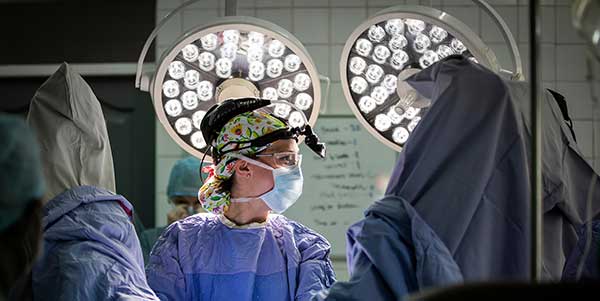Education & Training

University Hospitals Reconstructive Urology and Gender Affirmation Surgery Fellowship educational program can be either one or two years in length, pending the pursuit of an optional research and professional development year.
Clinical Year
In their clinical year, fellows will spend one and a half days a week in clinic (half-day independent clinic) and three and a half days in the operating room (performing both basic reconstructive urology and gender-affirming surgery). Details of these operational categories are as follows:
- Basic Reconstructive Urology: Anterior Urethral Reconstruction, Posterior Urethroplasty (Radiation, PFUI, VUAS), Urinary Diversion for end-stage bladders, Continent Urinary Reconstruction, Ureteral Reconstruction (open and robotic).
- Gender Affirming Surgery: Phalloplasty (approx. 40/year), Vaginoplasty (Penile Inversion (approx. 20/year), Robotic Peritoneal (approx. 50/year)), Metoidioplasty, Re-operative surgery on patients with prior gender affirmation.
- Independent Clinical Duties: Fellows will take attending call six weeks/year, and conduct outpatient clinic one half-day/week.
In addition to clinic and surgical duties, fellows have research responsibilities during this year that include participation in bi-weekly research meetings, leverage of existing clinical and research databases and contributing data to prospective registries maintained by UH.
Research & Professional Development Year
Fellows will work with faculty mentors to design three to four research projects for the research year prior to starting. The fellow will contribute data to existing prospective clinical and biorepository registries.
The fellow will have the opportunity to engage in ongoing basic sciences and translational research in tissue engineering, device design and microbiome fields, as well as engage with current academic and community partners of UH LGBTQ+ & Gender Care to gain instruction and expertise in community-based participatory research, advocacy and legal aid.
Clinical requirements during the research year include running an independent clinic one half-day per week and taking attending call (six weeks/year).
Clinical Electives
Fellows will have the option to work with our sexual medicine faculty to gain proficiency in penile prostheses, Peyronie’s and male incontinence surgeries. The Men’s Sexual Health team at UH performs approximately 100 penile implants and approximately 50 male incontinence procedures per year in addition to advanced infertility treatment.
Building a Gender Affirmation Program
For fellows who are interested in building a gender affirmation program upon graduation, additional professional development opportunities include a customized leadership course, as well as an eight-week population health program focusing on LGBTQ+ health (the latter culminating in a capstone project for program design and award of a health certificate).
Ongoing Evaluations
In addition to the standard GME Medhub evaluations, fellows will meet with the University Hospitals Reconstructive Urology and Gender Affirmation Surgery Fellowship Director and Research Director every two months to evaluate their progress.


